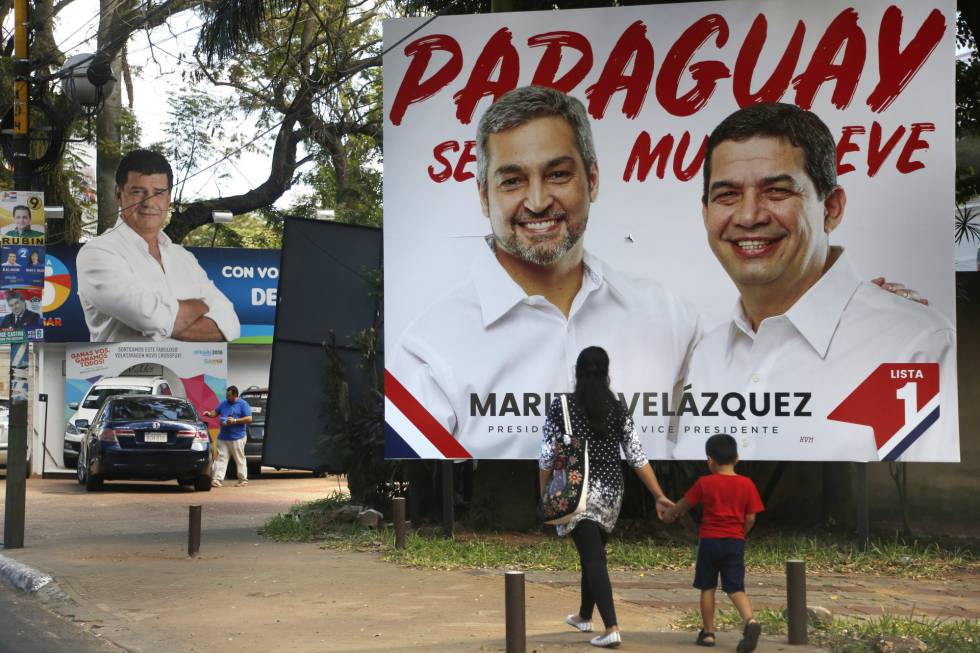Paraguay’s ruling Colorado Party is in turmoil just ahead of April 2023 elections.
The right-wing conservative “Partido Colorado” has long dominated Paraguayan politics and has remained in power even amid the volatile anti-incumbent wave that has recently swept Latin America.
With a brand focused on pro-business stability and traditional values in a country often considered the most Catholic in the region, it has held power for all but five of the last seventy-seven years, losing only the 2008 election when two candidates split the party’s electorate.
But ahead of the December 18 primaries, the party faces major corruption scandals and an internal split that could give the opposition another rare opportunity.

The party’s two factions – led by current President Mario Abdo Benítez and former President Horacio Cartes, respectively – both face allegations of high-level corruption.
Both now fear prosecution should the other party come to power.
It has already been a tumultuous year. In February, Abdo’s interior minister released evidence linking Cartes, a major businessman and one of the landlocked South American nation’s wealthiest men, to money laundering networks and cigarette smuggling – perhaps Paraguay’s best-known illegal activity.
In July, the U.S. State Department labeled Cartes a participant in “significant corruption” and alleged links to transnational organized crime.
A leader of the other faction was similarly classified just a few weeks later: Abdo’s incumbent vice president, Hugo Velázquez, an early favorite to win the party’s primary. He dropped out of the race but has not resigned.
Both Cartes and Velázquez deny the allegations while the domestic investigation continues. In late September, a major fire broke out at Paraguay’s Supreme Electoral Court headquarters.
Thousands of electronic voting machines-about a third of the nation’s stock-were destroyed, but officials say the losses will not delay party primaries scheduled for December 18. The cause of the fire is still under investigation.
Despite the heightened drama, there are few policy differences between the two factions of the Colorado Party so far; both parties are expected to advocate pro-business, socially conservative programs focused on job creation.
Whoever wins will go into the April general election as the favorite. However, the losing faction could field its own competitive candidate. It would also give the opposition, which is currently divided but wants to rally behind a single candidate, a chance at the presidency.
ELECTIONS WITH MUCH AT STAKE
The new allegations against Colorado party leaders come at a particularly sensitive time. Corruption and organized crime are on everyone’s minds following a series of murders.
In May, the country neighboring Brazil, Argentina, and Bolivia was shocked when the top prosecutor was murdered on his honeymoon in Colombia after an investigation uncovered a large drug lab in Paraguay’s largest prison.
In June, the director of the prison was also murdered.
In addition, Paraguay could soon receive massive revenues after renegotiating the terms of the colossal Itaipú dam it shares with Brazil. This renegotiation has been the most important foreign policy priority in modern Paraguayan history.
The original Itaipú Treaty was signed in 1973 by Paraguay and Brazil under dictators Alfredo Stroessner and Emílio Garrastazu Médici, respectively.
It created the world’s largest hydroelectric dam, surpassed only by China’s Three Gorges Dam (2012), and set conditions that have long been perceived as deeply unjust in Paraguay.
Paraguay uses little of its allocated energy from the dam but must sell the unused energy to Brazil at low prices to pay off the massive debt to build the dam.
In 2023, that debt will be paid off, and the 1973 contract will expire.
Paraguayans hope to secure the right to sell unused energy at full market prices to countries like Chile and Argentina by renegotiating.
In short, voters know that enormous revenues await the country that can be invested in national development and herald fundamental change – if they are not “misappropriated.”
Paraguay has persistently high poverty, inequality, and economic informality rates, even compared to the rest of Latin America and the Caribbean. GDP per capita was US$5,400 in 2021, well below the regional average of US$8,340.
Paraguay weathered the COVID-19 pandemic relatively well; the Abdo government implemented cash transfers and other social programs that mitigated the social and economic damage of the pandemic, and in 2020 Paraguay recorded the smallest GDP decline in the region.
In 2021, GDP increased by 4.2%. However, most estimates suggest that growth in 2022 will be well below 1%.
That is due to high inflation and a historic drought hurting soybeans – Paraguay’s main export – and the rest of the agricultural sector, the main focus of the country’s economy.
This year’s Colorado party primaries are the most tumultuous in a long time. Tensions over the economy, the renegotiation of the Itaipú Agreement, and the threat of criminal prosecution of several top politicians are likely to boil over during the primaries.
If so, Paraguay could experience one of its most competitive and turbulent election periods.
With information from Latina Press

